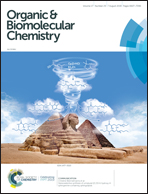Development of dansyl based copper(ii) complex to detect hydrogen sulfide in hypoxia†
Abstract
Hydrogen sulfide (H2S) has been reported as a gaseous signaling molecule in cells. H2S modulation is dependent on the partial pressure of oxygen in cells, which means hypoxia can induce H2S production under various pathophysiological conditions. Hypoxia is a common condition in solid tumors and can lead to malignant tumors that may become aggressive and result in worse prognosis. We designed and synthesized probe Cu-CD for H2S detection under hypoxia conditions. It is selective and sensitive toward various biological thiols, reactive nitrogen species (RNS), and reactive oxygen species (ROS). The fluorescence intensity of Cu-CD in the cytoplasms of HeLa and EMT6 cells was enhanced in proportion to the concentration of exogenous/endogenous H2S. Moreover, Cu-CD can be able to detect endogenous H2S production accompanied by expression of HIF-1α. Therefore, Cu-CD can be a key tool to explore how H2S contributes to neovascularization and growth of solid tumor tissues in pathophysiological or hypoxic conditions.



 Please wait while we load your content...
Please wait while we load your content...